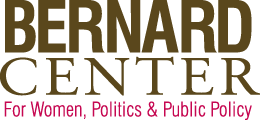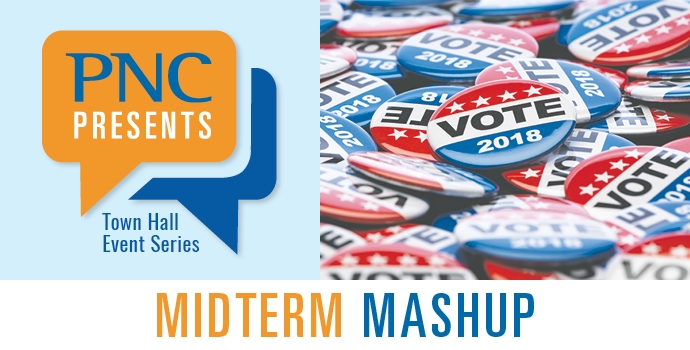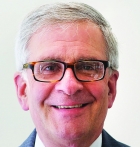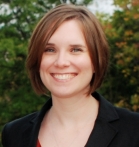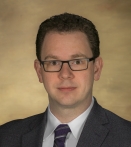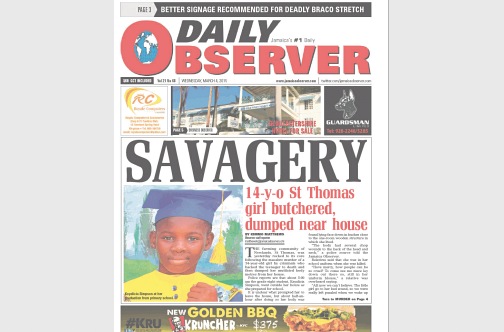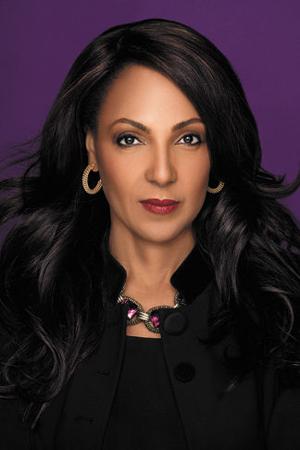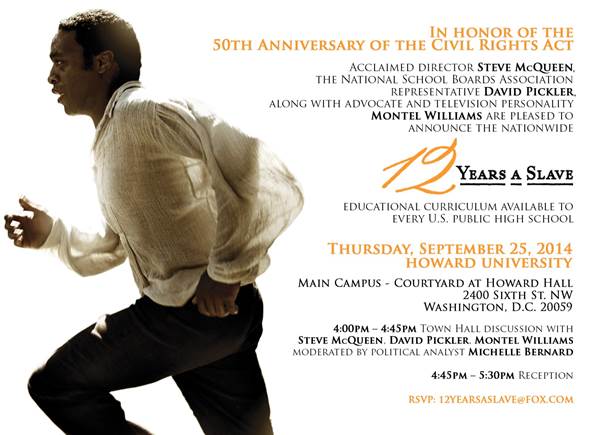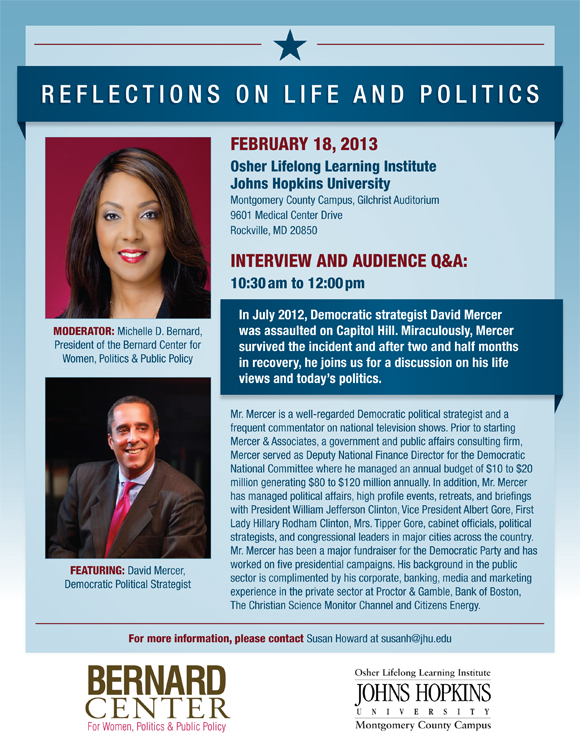Events: Midterm Mashup: Tuesday, October 16 | Heinz History Center | 6:00p.m. Panel
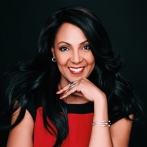
Women’s Voices of the Jamaican Diaspora: Our Children Matter
July 5, 2015 by Michelle D. Bernard in Children's Rights, Events, Feminism, International Children's Rights, Women's Rights
Sunday, July 05, 2015
On June 18, 2015, Michelle D. Bernard , president & CEO of the Bernard Center for Women, Politics & Public Policy, delivered the following speech, “Women’s Voices of the Jamaican Diaspora: Our Children Matter,” before the Kiwanis Club of New Kingston on the occasion of their 25th anniversary. Coincidentally, Bernard’s speech was delivered on the final day of the 6th Biennial Jamaica Diaspora Conference which took place in Montego Bay, Jamaica. The following is an edited version of her June 18th remarks as delivered at the Jamaica Pegasus. These excerpts of Bernard’s speech were originally published on Sunday, July 5, 2015 in the Jamaica Observer.
I want to thank the Kiwanis Club of New Kingston Jamaica not only for this extraordinary opportunity to speak to you today as we celebrate the club’s 25th anniversary, but also, for bringing me back home to Jamaica. It’s been nine, almost 10 very long years since I was last here. As my flight landed in Montego Bay, all I could think was, “Thank you, God, thank you, Kiwanis Club of New Kingston, and thank you to my beautiful, loving Jamaican family.”
So it with great love in my heart for this land of milk and honey that I say that this journey is remarkable, because I am humbled and honoured to speak to you as the daughter of Dr. Milton Bernard of Kingston and Mrs. Nesta Bernard of Lucea. My parents are native-born Jamaicans; my father is the first to tell the world that he is an extremely proud graduate of Calabar; my mother, who is not nearly as brazen, is a proud graduate of Rusea’s High School. Both graduates of Howard University in Washington, DC, I believe that if they were with us at the Pegasus today, they would say that one of the greatest blessings of their life has been being able to raise their four children with a love for all that Jamaica is today and will become in the future.
I have told many people, and have said this in many speeches, and I am especially proud to stand before you this morning and once again proclaim: I would not be standing here at this podium today, were it not for the beliefs instilled by my parents and every member of our family, many of whom are here today. On my mother’s side of the family, my aunt Cynthia McCleod and great-aunt Ivey Henry are here today. From my father’s side of the family, my uncle, Dr. Wesley Bernard, my aunt and his better half, Nancy, and my cousin and Kiwanis Club member, Christine Bernard-Taylor. And I would be remiss if I didn’t introduce you as well to my God-father and baby-sitter extraordinaire, Dr. Cleo Taylor. It is my Uncle Cleo who was once charged with responsibility for baby-sitting me in Washington. Being the kind uncle he has always been, he watched with great amusement as I set my parents’ couch on fire. I have never thought to ask whether he was ever asked to baby-sit me again.
My aunts and uncles will tell you that my parents faced many hardships and obstacles as they navigated their way from their home country of Jamaica to the United States at the height of the Civil Rights Movement in the 1960s. But my aunts and uncles will also tell you that my parents were not as young and naïve as most would perceive. They left the comfort and serenity of Jamaica and placed themselves directly in the path of dangers faced by those advocating for civil rights. They knew exactly what they were getting into. They knew what their families not only wanted for them, but what was expected of them. They knew the importance of their Jamaican heritage and were determined to hold on to it as they pursued their American dream.
Raising a family during this turbulent time was anything but easy. Discrimination was rampant. Upon hearing their accents, many doors were slammed in their faces. From housing to employment to childcare facilities.
As a dental student at Howard University, my father took on self-employment as a cab driver to support our family. Both of my parents refused to enter a workplace through the back door, nor did they assent to being employed by someone who thought of them “as less than” because of the colour of their skin, their gender, or their Jamaican accents.
My parents were inspired deeply on the day of August 28, 1963 by the march on Washington in DC. My father shuttled people back and forth across town to the march, listening to their stories and listening to the speeches on the radio. My mother sat at home nursing me — then only a month-old — and listened intently, to Dr King’s “I Have a Dream Speech” on the radio.
They heard Dr King loud and clear. Their dreams for our family were not the pie-in-the-sky dreams automatically handed to white families in the United States at that time. They wanted the dream that Dr King spoke of; where they would be judged by the content of their character.
My father taught us the art of what I now call “smart dissidence”. My mother taught us the beauty of feminism and the importance of using your God-given talents, education, and social activism for service to all children and the black community. She taught us the beauty of self-love and that black is beautiful. Now that I am a mother myself to two young children, I talk to my mother and the women in my family here in Jamaica about many of the things I took for granted as a child.
Yes, most of our talks are about normal everyday things, but we also discuss something that communities of other cultures are fortunate to not have to address. We talk about the wave of violence plaguing our black children both here in Jamaica and in the United States. There are atrocities in the U.S. that mirror some of the atrocities here in Jamaica. They are heart-rending, cowardly attacks on our black children. The very ones who we believed were protecting them are killing children in the US. The systemic racism and oppression of unarmed black boys and men enacted by police officers in some communities in the U.S. is staggering.
In Detroit, Michigan, seven-year-old Aiyana Jones was killed while sleeping on the couch in her grandmother’s home when police raided, searching for a murder suspect.
In Sanford, Florida, 17-year-old Trayvon Martin was killed while walking home in his own gated community by a neighbour viewing him as a threat simply because of his skin colour and hooded sweatshirt.
In Ferguson, Missouri, unarmed 17-year-old Michael Brown was shot and killed by police officer Darren Wilson.
In Cleveland, Ohio, 12-year-old Tamir Rice wielded a toy gun in a park and was shot dead by bloodthirsty police officers.
I have heard the stories of Jamaica’s children and the more than 30 children who have been killed since the beginning of the year. I have read many newspaper articles. I have winced. I have cried. You know their stories well: Stories like that of McKenzie Elliot, who newspaper reports state was gunned down by a gang member as she played on her front porch.
I read a news report where a police commissioner suggested that mothers in Jamaica could do a better job at shielding their children from sexual violence by not allowing male companions and stepfathers to sleep in the same room of their homes. Naturally, that is a valid observation. But why was it not mentioned that [a] male companion and stepfathers shouldn’t rape or sexually violate young children? Why no mention of their responsibility in the matter?
In another article, I read that several child advocates believed women could be the key to stopping the senseless murder of young children, because they were too silent on the whereabouts of killers, sometimes even harbouring killings right under their noses. But why was there no plea to the men? The men who could also be harbouring killers within their homes? The men who could also be passive about the violent activity around them?
I read yet another news report in which a young schoolgirl was killed and, as her mother and grandmother grieved, a mob of neighbours physically attacked them. They believed the mother and grandmother neglected the girl, because authorities discovered she was pregnant when they found her body. There are parallel issues of how we got to this devastating place where children are dying — both here and in the US.
Issues such as racism, economic insecurity, poverty, lack of educational opportunities, inter-personal violence, gang warfare, the drug trade, as well as undiagnosed and untreated mental illness plague both countries. But I would argue that no one should ever suggest that it is Jamaican women who are at fault when the innocent children of this country suffer at the hands of criminals.
As a global community, in seeking solutions to the senseless murders of our children, we must remember that centuries ago, it was black women who had children ripped from their bodies and sold into slavery; her husband sold away from her or who many times faced dehumanising abuse right in front of her. In the U.S., children worked side by side in the cotton and tobacco fields next to their mothers, subjected to the same physical and sexual abuse. In Jamaica, it was on the sugar plantations, where women were beaten, raped, whipped, amputated, and forced into the most degrading of atrocities under the institution of slavery. And it was the black woman who also led slaves to escape and to rebel. In the U.S., it was Harriet Tubman. In Jamaica, Nanny of the Maroons. After generations of endured psychological and physical abuse, the black woman held up the black family, many times with the black man, and many times without.
Shirley Chisholm, another sister of the Caribbean diaspora, was a courageous and prolific woman. She was deeply admired by my parents and me. She quoted legendary feminist Francis Beal in her famous speech in 1974, “The Black Woman in Contemporary America”:
“By reducing the black man in America to such abject oppression, the black woman had no protector and she was used — and is still being used in some cases — as the scapegoat for the evils that this horrendous system has perpetrated on black men. Her physical image has been maliciously maligned. She has been sexually molested and abused by the white colonizer. She has suffered the worst kind of economic exploitation, having been forced to serve as the white woman’s maid and wet-nurse for white offspring, while her own children were more often starving and neglected. It is the depth of degradation to be socially manipulated, physically raped, and used to undermine your own household, and then to be powerless to reverse this syndrome.”
Chisholm’s speech, aptly quoting legendary feminist Francis Beal, is chilling. It was delivered 41 years ago. But it is just as fresh, relevant, and needed today.
I have always loved the Jamaican motto: “Out of Many-One People.” These five words say so much. Since I was a young girl I have heard many interpretations of this motto. But today, I want to put this phrase into the context of the women of the Kiwanis Club of New Kingston; women who are committed to serving our children and working to eradicate this senseless violence. The Kiwanis Club of New Kingston shows us that, in the context of our children, the motto means that out of the many inhumane, systemic acts of colonial domination, the fearlessness of one people emerged.
There is a fight in the eyes of the Jamaican women who are fearless against anyone who tries to tear this nation apart. I believe this fight comes in the form of the women and men who stand to counter these attacks. The women and men working around the clock to provide safety, education, and resources for our children. The men and women who work to uphold the basic human rights of every child as spelled out in the United Nations’ Convention on the Rights of the Child in Jamaica.
There is fight in the eyes of warrior leaders, these amazing women of the Kiwanis Club of New Kingston who are mothers, sisters, aunts, grandmothers, caregivers, friends of children on this island. Women who love this island, and love the work and service they do on behalf of children and families. There is fight in the eyes of the protesters, marching from city to city in the United States, letting everyone within earshot and sight know that black lives matter.
The Kiwanis Club of New Kingston shows us that “out of many, one people” means that women and men can work as one to combat the injustices facing Jamaican people, such as domestic violence and the mistreatment of women. It means that Jamaican women are not forced to haul the oppressive weight of racism alone. It means that Jamaican men stand shoulder to shoulder with us; equal partners in the fight. Together, we reject the stereotypical image of the Jamaican woman and girl-many times even perpetuated by both white mainstream and black American media as being “force ripe” or striving to publicly display the smallest bikini on the largest bosom and bottom known to man.
Our reputations are now well known in the areas of technology, science, medicine, law, education, entrepreneurship, executive leadership and, of course, government. We are a sisterhood. We are groundbreakers and visionaries, from Prime Minister Portia Simpson Miller to scientists like Dr. Deborah Maxine Gossell-Williams and science fiction writers like Nalo Hopkinson.
The Kiwanis Club of New Kingston shows us that “out of many one people” means that our place in the African diaspora is one of a people who work together to stand up against the forces that seek to tear us down, to tear our families apart. Violence places all of us, especially women, who are already faced with so many burdens and challenges, in such a position of vulnerability and insecurity.
Two years ago, I was asked by the Lawyer’s Committee for Civil Rights Under Law to write a book highlighting their accomplishments and dedication to civil rights and social justice on their 50th anniversary. It was an honour to speak with some of the 244 lawyers requested to be a part of a special committee created by then President John F Kennedy in 1963. The work done by much of the lawyers was pro bono publico: for the good of the people. Many of these lawyers worked courageously alongside civil rights activists, advocates, community leaders, and clergy to ensure to eliminate racial discrimination wherever it existed.
It was here that I learned a big lesson, one that I will never forget: I learned the many people active in the U.S. Civil Rights Movement understood emphatically that unless the deeply rooted social ills plaguing our communities were not addressed, the balance of the entire family was subject to destruction. They knew that their children were going to be subjected to vicious, violent racist attacks. Through their own non-violent means, they literally took the blows, the beatings, the whippings, the dog bites, the water from the fire hoses, and the brutal assaults all so their children and children’s children wouldn’t have to. That is why it was so important to push for the Civil Rights Act, which was eventually signed into law in 1964 by President Lyndon Johnson. These were brilliant, visionary people in the movement. They knew that the sense of connection as human beings with rights would be lost without that landmark legislation.
When violence happens to our children, there is a disconnection. Somewhere, somehow, there is a disconnection. So how do we get back to the place where we feel our connectedness again, as Jamaicans?
We must work together to address and call out the factors within institutions that are hurting our children. We must work tirelessly to enact legislation forcing these oppressive systems that impress upon black children that they are inferior. We must enact laws that give the power back to those that love them and want them protected and safe. We must implore upon our children that they have rights. We must tell them what those rights are. We must not be afraid to address and deal with the cuts and bruises that we don’t see on our children; we have to address the root of the abuse happening in families and deal with mental illness and psychosis.
I also believe this disconnection comes from a very dark place where violence and hatred is born: In the core of the mind, with the negative self-talk that says: “I hate myself, therefore I want to hurt all of those around me”.
In 2013, Dr. Gary Slutkin, an epidemiologist began looking at gun violence in the United States and noted that its spread followed the patterned of infectious diseases. Today, I would ask that, as a community, we ask the question that Dr Slutkin has asked: Is it possible that our culture has misdiagnosed violence and, if so, shouldn’t we approach violence as a contagious disease, looking at science, public health strategies, and our communities to stop it?
We have to remember our connection to this land, to each other. We are required to draw from our shared history to remember our strength and power. And we must look back in history to know where we are going. We must not forget the children who are left to pick up the pieces of their fragile lives when their parents have lost a job, when they are forced to live in poverty while their parents try to keep their family together. We must not forget the children who have been killed through acts of violence. We must not forget the women who are trying to shield their own families from the destruction of physical and sexual violence and feel powerless and shame.
The stakes are high, but we know that we can no longer afford inaction. As my mother would say, if we don’t act, “Dog ago nyam yuh supper.”
Michelle D. Bernard is president of the Bernard Center for Public Policy, a media commentator, author and attorney.
Michelle Bernard for Kiwanis luncheon
June 16, 2015 by Michelle D. Bernard in Culture and Politics, Events, Feminism, In The News, International Women's Rights, Speeches, Women's Rights
MICHELLE Denise Bernard, a journalist, political analyst, lawyer, author and president and CEO of the Bernard Center for Women, Politics and Public Policy will be the guest speaker at The Kiwanis Club of New Kingston’s 25th anniversary luncheon on June 18.
The all-female club is made up of a group of professional and businesswomen who came together 25 years ago to give service through the Kiwanis movement in Jamaica. For the past 22 years the club has hosted the luncheon where pioneering women have been recognised for their distinctive contributions or trailblazing efforts.
The Bernard Center is a research and educational institution whose mission is to change the terms of critical domestic and foreign policy debates and challenge the media to discuss those issues in order to improve the socioeconomic status of women and ethnic and religious minorities.
Based in Washington, DC, Bernard has had a distinguished career in domestic and foreign policy matters, particularly matters of racial, social and gender justice and the advancement of democracy, economic liberty and the rights of women.
She was named in the November 2014 issue of Essence magazine as a ‘Rising Star’ on its annual ‘Money & Power’ list.
A contributor for Huffington Post, she is a regular political analyst on CNN and MSNBC, and serves on the executive board of the International Women’s Forum of Washington, DC, as well as the advisory board of the American Board for Certification of Teacher Excellence.
She is also an advocate for children with special needs.
The theme of this year’s luncheon is ‘Women’s voices: Our children matter’. It will be focusing on raising funds for the club’s major project — a blood donor drive through the National Blood Transfusion service; as well as children with special needs through The McCam Child Care & Development Centre; building leadership and entrepreneurship among vulnerable youths in inner city communities; and a scholarship fund which was launched by the club.
This article originally appeared in All Woman on June 8th, 2015.
CNN & MSNBC’s Michelle Bernard for Kiwanis event
June 16, 2015 by Michelle D. Bernard in Culture and Politics, Events, Feminism, In The News, International Women's Rights, Speeches, Women's Rights
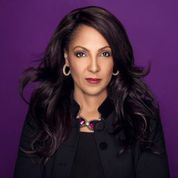 American journalist, political analyst, and lawyer Michelle Bernard will be the special guest at the Kiwanis Club of New Kingston’s 25th anniversary luncheon on June 18.
American journalist, political analyst, and lawyer Michelle Bernard will be the special guest at the Kiwanis Club of New Kingston’s 25th anniversary luncheon on June 18.
Bernard, who is also president and CEO of the Bernard Center for Women, Politics & Public Policy, is scheduled to deliver an international perspective to the luncheon’s theme ‘Women’s Voices: Our Children Matter’.
Based in Washington, DC, Bernard — who has Jamaican heritage — has had a distinguished career in domestic and foreign policy matters, particularly racial, social, and gender justice and the advancement of democracy, economic liberty, and the human rights of women, ethnic and religious minorities globally.
Bernard was named in the November 2014 issue of Essence magazine as a ‘rising star’ on its annual Money & Power List. She is contributor to the Huffington Post, a regular political analyst on CNN and MSNBC, and serves on the executive board of the International Women’s Forum of Washington, DC, as well as the advisory board of the American Board for Certification of Teacher Excellence.
Bernard is also an advocate for children with special needs.
The Bernard Center for Women, Politics & Public Policy is a research and educational institution designed to change the terms of America’s most critical domestic and foreign policy debates and challenge the media to discuss those issues in order to improve the socio-economic status of women, ethnic and religious minorities; expand the effective participation of women, ethnic and religious minorities in the political and public policy arenas; and promote, advance and support individual rights, free markets, comprehensive education reform, personal responsibility, and smart government as the keys to achieving the American dream.
Its scholars and analysts conduct high-quality, independent research and use the results to provide innovative, practical recommendations that advance these goals.
The luncheon, which usually recognises pioneering women for their distinctive contributions or trailblazing efforts, is scheduled for midday at the Jamaica Pegasus hotel in New Kingston.
This article originally appeared in the Jamaica Observer on June 7, 2015.
Kiwanis Club of New Kingston – 25th Anniversary Luncheon
May 28, 2015 by Michelle D. Bernard in Culture and Politics, Events, International Women's Rights, Speeches, Women's Rights 0 CommentsMichelle D. Bernard: Women’s History Month Event Rescheduled
April 11, 2015 by Michelle D. Bernard in Events, Feminism, Speeches, Women's Rights
The Security Assistance Command will hold this year’s Women’s History Month observance for the Team Redstone Equal Employment Opportunity Office on April 20 at 10 a.m. in Bob Jones Auditorium. This event was rescheduled from March.
The theme of this year’s Women’s History Month observance is “Weaving the Stories of Women’s Lives.”
The observance honors the accomplishments and contributions of women from the past and recognizes their impact on the force of today. This is a time each year for everyone to reflect on the pioneering efforts women have made to make this nation strong, as well as inform and educate people about the important roles and contributions that women have played in this nation’s history.
The keynote speaker is Michelle D. Bernard, a lawyer, political and policy analyst media commentator, author and president and chief executive officer of the Bernard Center for Women, Politics and Public Policy.
“As we celebrate women’s history month, let us have the courage, like those brave women who came before us, to challenge immoral and unjust laws,” Bernard said in describing a mother who had challenged a law concerning public schools.
In January Bernard was awarded the Anvil of Freedom Award for journalism and democracy by the University of Denver’s Edward W. and Charlotte A. Estlow International Center for Journalism and New Media. She was named as a “Rising Star” in the November 2014 issue of Essence magazine on its annual “Money & Power” list.
Bernard is a political analyst on CNN and MSNBC, and regularly appears on shows such as “Real Time with Bill Maher” and “The McLaughlin Group.”
The April 20 event will also include the presentation of awards to the Women’s History Month essay and display contest winners.
For more information about the program, call Terrian Hicks at 450-5628.
Hillary Clinton, the 2016 Presidential Election & Women in Politics
April 11, 2015 by Michelle D. Bernard in Civil Rights, Culture and Politics, Domestic and Economic Policy, Events, Feminism, Presidential Elections, Speeches, Women's Rights

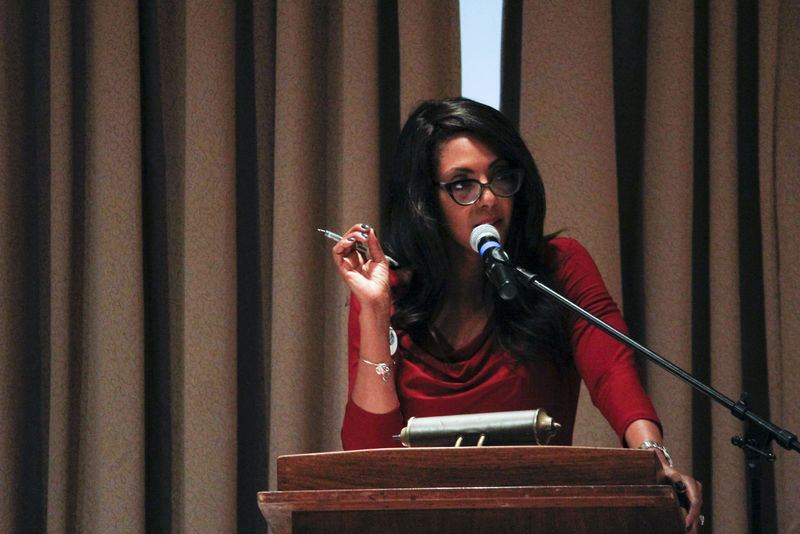
Attorney, author and political activist Michelle Bernard spoke at the Memorial Union on March 31. She talked about how Iowa is important to politics, how women are becoming more prevalent in the political world and how people see women’s issues. “We need more women’s voices and we need them running at the national level,” Bernard said. The event was sponsored by the Carrie Chapman Catt Center for Women and Politics.
Michelle Bernard, an attorney, author and political analyst, touched on bipartisanship, the importance of women’s voices in government, the possibility of Hillary Clinton running for president and other issues in her lecture at the Memorial Union on Tuesday night.
Bernard, who often serves as a legal and political analyst on MSNBC, continually stressed the importance of women continuing to run for public office and run until they win.
Bernard also addressed sexism in the media, especially as it is related to female politicians. She touched on body shaming, fashion policing and stereotyping in the media. Bernard suggested that anyone who disagrees with how women are portrayed in the media should first “vote with their remote control,” or refuse to give viewership to programs that portray women in a way they find sexist, and second, always call out instances of sexism.
With the 2016 presidential race approaching, Hillary Clinton, who is expected to announce her candidacy, was a hot topic, both in Bernard’s speech and in the following question and answer session. Bernard expects Clinton to run, and said she believes Clinton should announce her campaign in Iowa. While Bernard said she does not consider herself to be on the “Hillary bandwagon,” she said she felt Clinton is ready to run.
Megan Danielson, junior in advertising and communications studies, expressed appreciation for Bernard addressing campus rape, an issue Danielson said she believes to be very important to ISU students. Bernard said campus rape was a “horrific crime.”
Kat Hemken, junior in public service and administration in agriculture, said she was glad Bernard brought up how women govern differently than men, but wished she would have gone more in-depth.
Bernard mentioned how women in Washington have recently been doing a lot of bipartisan work, especially on the topics of military rape and immigration rights, by reaching across the aisle and finding common ground. Hemken said she’d done a lot of reading on the subject, and thinks Bernard missed some important points.
Bernard remained optimistic about the present and future of women in politics and said she “[chooses] to look at it as the glass half-full.”
“We are moving forward and not looking back, Bernard said.”
Bernard’s lecture was part of the Carrie Chapman Catt Center’s Mary Louise Smith Chair, which brings prominent women leaders to the university once or twice a year to speak about politics.
Michelle Bernard to discuss how women are changing politics on March 31
March 26, 2015 by Michelle D. Bernard in Civil Rights, Culture and Politics, Events, In The News, Speeches, Women's Rights
Attorney, author and political analyst Michelle D. Bernard – who is the founder, president and CEO of the Bernard Center for Women, Politics and Public Policy – will speak March 31 at Iowa State University as the spring 2015 Mary Louise Smith Chair in Women and Politics.
She will present “How American Women are Changing Politics” at 7:30 p.m. in the Memorial Union’s Sun Room. The presentation – which is sponsored by the Carrie Chapman Catt Center for Women and Politics, the Office of the Senior Vice President and Provost, and the Committee on Lectures – is free and open to the public.
“Bernard, who describes herself as right of center, is known for her analysis of a variety of political and public policy issues, both domestic and foreign,” said Dianne Bystrom, Catt Center director. “In October 2014, she was named a rising star by Essence magazine for promoting social justice for people of color and minorities—particularly women.”
In the Essence article, Bernard said: “I do my best to be a voice for those who have no voice in the most important political and policy debates.” She uses mass media outlets such as CNN, MSNBC, the Huffington Post, YouTube and Twitter to delve into issues.
An attorney by training, Bernard is a frequent political and legal analyst on MSNBC; appears regularly on “The McLaughlin Group”; is a guest commentator on National Public Radio’s “All Things Considered”; and is a contributor for the Huffington Post and the Washington Post’s “She the People.” She also has appeared on CNN’s “The Situation Room”; FOX News’ “America’s Newsroom,” “Hannity and Colmes” and “The O’Reilly Factor”; and HBO’s “The Bill Maher Show.” On Jan. 23, 2015, Bernard was awarded the Anvil of Freedom Award for journalism and democracy by the University of Denver’s Edward W. and Charlotte A. Estlow International Center for Journalism and New Media.
Bernard is the author of “Moving America Toward Justice: The Lawyers’ Committee for Civil Rights Under Law, 1963-2013” and “Women’s Progress: How Women are Wealthier, Healthier and More Independent Than Ever Before.” She also contributed a chapter on “Powerful Beyond Measure” for the 2010 book, “Secrets of Powerful Women: Leading Change for a New Generation.”
Prior to founding the Bernard Center for Women, Politics and Public Policy, she served as president and CEO of the Independent Women’s Forum and practiced law as a partner in the Washington, D.C., firm of Patton Boggs LLP. Bernard holds a Bachelor of Arts degree in philosophy and political science from Howard University and a law degree from Georgetown University.
Speaker for Martin Luther King Jr. Day Breakfast sees “A War on Black Boys”
December 23, 2014 by Michelle D. Bernard in Criminal and Social Justice, Culture and Politics, Domestic and Economic Policy, Education and School Choice, Events, In The News
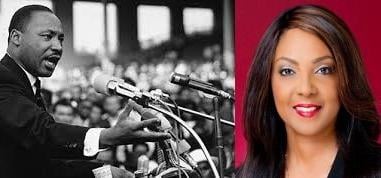
Michelle Bernard will be the keynote speaker Monday, Jan. 19 at the 27th Annual Martin Luther King Jr. Breakfast, which benefits the Crispus Attucks Community Center.
Six years after a black family moved into the White House, Bernard, 51, who is black, considers the country more racially polarized than any time she can remember.
A frequent guest on MSNBC and CNN, Bernard said in a phone interview she thinks an anti-Obama backlash is partly responsible for a retreat in civil rights and social justice.
Seeing a black man take charge of the world’s most powerful nation, she said, left a “nasty taste in the mouths of some.”
Bernard will have an opportunity to elaborate when she speaks here Monday, Jan. 19 at the 27th Annual Martin Luther King Jr. Breakfast sponsored by the Crispus Attucks Community Center, named for a black man killed in the 1770 Boston Massacre.
More than 240 years later, the national spotlight is once again on black men dying at the hands of civil authorities, spurring protests by the Black Lives Matter movement, including a recent die-in at Park City mall.
On cable TV, Bernard has chosen provocative words to express her dismay at the unpunished killings of Trayvon Martin, Michael Brown, Eric Garner and other black men.
“It is an absolutely deplorable situation that the United States, which is supposed to be the greatest nation on Earth, sits back and allows black boys to be murdered,” Bernard said on MSNBC’s “Hardball” a week after a white police officer shot the unarmed Brown at least six times.
“There is a war on black boys in this country. In my opinion, there is a war on African-American men,” Bernard said on the show.
In a recent phone interview, Bernard didn’t back away from her comments.
“The fact that he was tall and large and allegedly stole a cigarillo doesn’t mean Michael Brown should be shot down dead,” said Bernard, a former Washington attorney and lobbyist. “That to me is war.”
She said she was shaken when her son, while watching the news, turned and said, “Mom, is a policeman going to shoot me?”
“I thought I was going to cry,” Bernard recalled. “No child should feel that way. I would be remiss and irresponsible as a mother if I didn’t teach the reality of the world we live in.”
Stresses education
She said her son’s question prompted a long discussion in which she stressed education.
“From my perspective, if he has equal access to an excellent education and strives for excellence, he will always be safe,” Bernard said. “But I don’t know that to be true for certain.”
Bernard said she once pushed back against criticism that Obama wasn’t doing enough for black America. Now she thinks she may have been wrong.
“Maybe there is more the president can do in his last two years instead of worrying about people who antagonize him,” she said. “Maybe he needs to focus on what’s important for people of color and underserved communities.”
She said more must be done to improve inner-city education, ending “the school-to-prison pipeline, with one minor infraction and you’re in prison.”
Bernard said she doubts having more black officers helps communities living under “a police state.”
“African-American cops can be a problem also if we have a type of police force that’s militarized or looking for any excuse to be cowboys and shoot someone,” she said.
Cheryl Holland-Jones, Crispus Attucks’ executive director, said some will not agree with Bernard, but the theme of her remarks, “The Journey to Justice,” is appropriate given “the series of events that have taken place.”
“The journey we are on is to restore faith in each other,” Holland-Jones said. “Hopefully, her talk will lead us to conversations with some solutions to neutralize the animosity.”
“We hope all our speakers will leave the audience feeling they have been given a mission to move forward and to do something positive in the community in which we all live,” she said.
If you go
Time: 7 to 9 a.m.
Place: Franklin & Marshall College Alumni Sports & Fitness Center
Cost: $70. Scholarships available.
Benefits: Crispus Attucks Community Center.
Emcee: Ron Martin, WGAL news anchor.
Honorary chair: Barbara Hough Roda, LNP executive editor.
Performances: F&M’s I Have A Dream Choir and Music for Everyone Strings at Crispus Attucks.
Event sponsor: Franklin & Marshall
Dream Maker sponsors: Fulton Bank, Hagelgans & Veronis, High Companies, LNP Media Group, NXTbook Media, Steinman Foundation
 By JEFF HAWKES | Staff Writer | Posted: Tuesday, December 23, 2014 9:57 am
By JEFF HAWKES | Staff Writer | Posted: Tuesday, December 23, 2014 9:57 am
